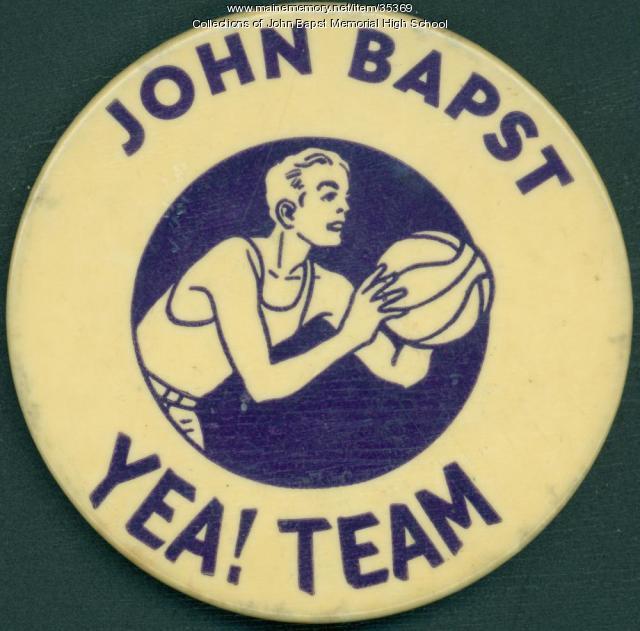Keywords: meetings
- Historical Items (756)
- Tax Records (3)
- Architecture & Landscape (5)
- Online Exhibits (107)
- Site Pages (240)
- My Maine Stories (39)
- Lesson Plans (3)
Online Exhibits
Your results include these online exhibits. You also can view all of the site's exhibits, view a timeline of selected events in Maine History, and learn how to create your own exhibit. See featured exhibits or create your own exhibit
Exhibit
The Sanitary Commission: Meeting Needs of Soldiers, Families
The Sanitary Commission, formed soon after the Civil War began in the spring of 1861, dealt with the health, relief needs, and morale of soldiers and their families. The Maine Agency helped families and soldiers with everything from furloughs to getting new socks.
Exhibit
Student Exhibit: The Story of the Heywood Tavern
The story of the Heywood Tavern in Skowhegan.
Exhibit
John Bapst High School was dedicated in September 1928 to meet the expanding needs of Roman Catholic education in the Bangor area. The co-educational school operated until 1980, when the diocese closed it due to decreasing enrollment. Since then, it has been a private school known as John Bapst Memorial High School.
Exhibit
Great Cranberry Island's Preble House
The Preble House, built in 1827 on a hilltop over Preble Cove on Great Cranberry Island, was the home to several generations of Hadlock, Preble, and Spurling family members -- and featured in several books.
Exhibit
Harry Lyon: An Old Sea Dog Takes to the Air
Through a chance meeting, Harry Lyon of Paris Hill became the navigator on the 1928 flight of the Southern Cross, the first trans-Pacific flight. His skill as a navigator, despite his lack of experience, was a key factor on the flight's success.
Exhibit
Student Exhibit: Save the Skowhegan Grange & Granges in General
A brief history of the Grange in Skowhegan, its importance to community history, and a plea to save it from destruction.
Exhibit
The Establishment of the Troy Town Forest
Seavey Piper, a selectman, farmer, landowner, and leader of the Town of Troy in the 1920s through the early 1950s helped establish a town forest on abandoned farm land in Troy. The exhibit details his work over ten years.
Exhibit
Mainers, like residents of other states, had differing views about slavery and abolition in the early to mid decades of the 19th century. Religion and economic factors were among the considerations in determining people's leanings.
Exhibit
Reuben Ruby: Hackman, Activist
Reuben Ruby of Portland operated a hack in the city, using his work to earn a living and to help carry out his activist interests, especially abolition and the Underground Railroad.
Exhibit
While numerous Mainers worked for and against woman suffrage in the state in the late nineteenth and early twentieth centuries, some also worked on the national level, seeking a federal amendment to allow women the right to vote
Exhibit
Student Exhibit: The Great By-Pass
The debate over a proposed bridge and bypass in Skowhegan in 2005.
Exhibit
Student Exhibit: Bloomfield Academy
In 1842, the new Bloomfield Academy was constructed in Skowhegan. The new brick building replaced the very first Bloomfield Academy, a small wooden building that had been built in 1814 and served as the high school until 1871. After that, it housed elementary school classes until 1980.
Exhibit
Music in Maine - Community Music
"Through him, I got to meet, work with, and join the Blues Family. The festival started in the parking lot of Rockland’s Trade Winds in 1990."
Exhibit
"… and sheet music for customers, and serve as a meeting place for musicians. Piano and guitar teacher Mary Curran Leighton (1885-1972) and her…"
Exhibit
Christmas, a Christian holiday observed by many Mainers, has a very public, seasonal face that makes it visible to those of all beliefs.
Exhibit
An enduring element of summer camps is the songs campers sing around the campfire, at meals, and on many other occasions. Some regale the camp experience and others spur the camp's athletes on to victory.
Exhibit
Student Exhibit: Ice Harvesting
Ice Harvesting was a big industry on the Kennebec River. Several million tons of ice could be harvested in a few weeks. In 1886 the Kennebec River topped the million ton on ice production.
Exhibit
Rum, Riot, and Reform - Temperance Membership
"… societies wore ceremonial regalia at their meetings to help signify their allegiance to the cause."
Exhibit
Music in Maine - Music Education
"… “singing cowboy” sold children-sized guitars to meet this market need. Eastern Music Camp Eastern Music Camp Click to learn more about the…"
Exhibit
Music in Maine - Community and School Marching Bands
"… regalia, both celebrating their Indigeneity and meeting the audiences’ expectations of what Native peoples looked like."
Exhibit
Success at riding a bike mirrored success in life. Bicycling could bring families together. Bicycling was good for one's health. Bicycling was fun. Bicycles could go fast. Such were some of the arguments made to induce many thousands of people around Maine and the nation to take up the new pastime at the end of the nineteenth century.
Exhibit
John Y. Merrill: Leeds Farmer, Entrepreneur, & More
John Y. Merrill of Leeds (1823-1898) made terse entries in diaries he kept for 11 years. His few words still provide a glimpse into the life of a mid 18th century farmer, who also made shoes, quarried stone, moved barns, made healing salves -- and was active in civic affairs.
Exhibit
Waldoboro Fire Department's 175 Years
While the town of Waldoboro was chartered in 1773, it began organized fire protection in 1838 with a volunteer fire department and a hand pump fire engine, the Water Witch.
Exhibit
Scarborough: They Answered the Call
Scarborough met every quota set by the state for supplying Civil War soldiers for Union regiments. Some of those who responded became prominent citizens of the town.
























